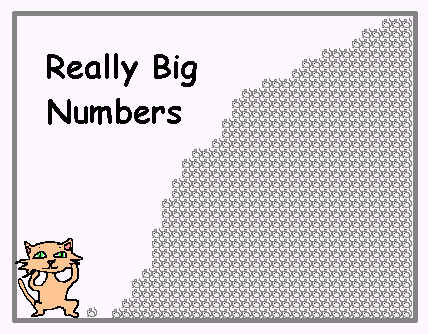





 |
 |
 |
 |
 |
 |
 other contests |
 back to main contest page |
|
Winners of the June - August 2005 Math Cats Writing Contest: |
 |
|
The contest was introduced like this: __________
Do you think you've ever seen a thousand things all in one place? How about a million? How about a billion?
Or can you help us begin to understand a really big number?
We like writing that is lively, creative, detailed, and personal. Remember - this is a math writing contest: we are interested in how you express yourself.
First Place - "How Big Is a Really Big Number?" by Anatole Wiering
Prizes
|
|
* First Place:
"How Big Is a Really Big Number?"
I like really big numbers. Big numbers are interesting for me. I like things in big numbers. For example, I like collecting a lot of things. I collect bottle caps, CTA bus cards, flower labels, and pennies. I like counting pennies and bottle caps.
What is a really big number? A really big number is many things. For example, a beach is a really big number of sand grains. What is the difference between a really big number and a big number? A big number you can count to, but a really big number is much harder to count to. For example, 30 is a big number, and 75,000 is a really big number. I can't count all the sand grains at the beach. I can't even count all the sand grains in my hand.
Another example of a really big number is if you go to page 119 in the book Math for Smarty Pants (Little, Brown and company, 1982).You will see a big pile of circles on the page. Those are all bottle caps -- over 100,000 of them! I can't count them. If I started to count them, I would be stuck in counting them. But I would like to collect them.
I would like to be able to count to a really big number. A Googol is a really big number. It is a 1 with 100 zeros after it. I wonder if anyone counted to a Googol. The highest number I counted to was 2,334. The highest number my cousin Dale counted to was 500,234. It took him hours and hours and hours.
I timed how long I counted:
I have a really big number of pennies. Probably over 15 dollars worth! I can't count them. What I did with my pennies is put 100 pennies into a measuring cup.
Now how did I find out that 300 pennies are 1 cup? I first multiplied 1/3 cup times 3; then I multiplied 100 times 3. How did I find out that 3,000 pennies are 5 pints? I multiplied 300 by 10 because that equals 3,000, and I multiplied 1 by 10, then I converted 10 cups into 5 pints.
Now what helps me with knowing how many pennies fill how many pints? I can't count 30,000 pennies, but I can imagine 6 gallons and 1 quart pennies. Instead of counting really big numbers, measure them! Measuring is faster than counting.
Really big numbers are fun. A big number is easy to count to, but a really big number is much harder to count to. I learned that really big numbers are easier to measure than to count to. Maybe I will collect a really big number of bottle caps. Then I won't be able to count them, so I will measure them.
|
|
* Second Place:
"REALLY BIG NUMBERS -What is a Million?"
What is a million? A lot of people talk about millions. I know there are about 10 million people in Los Angeles. There are about 2 million people in Riverside where I live. There are about 72 million pet cats in the USA. I have never seen a million before. I went to see Billy Gramm speak and there were about 60,000 people there. I also saw Mark McGuire play baseball in San Diego and there were about 40,000 people there.
How large is a million dollars? That is what everyone is asking even little kids like me. Most people just spend spend on little gadgets. I learned that the largest United States bill in circulation is the one hundred dollar bill and it takes 1000 of those to make one million dollars. A pile of one million in $100 bills fills up about 643 cubic inches (8" x 6"x 13") and was about the size of a 15 inch television set. It weighs almost 20 pounds (9 kilos). The stack of bills and it was 40 inches high (one meter). That is how much one million dollars is. I guess a million dollars in one dollar bills would be 100 meters high.
"Billions of Mice"
"I just don't understand big numbers!" cried Mimi the cat to her friend, TJ.
|
|
* Prizes
The first place prize is a Math Cats T-shirt. The first through third place entries receive large Math Cats certificates.
* We're helping a special friend of Math Cats, too!
Wendy of Math Cats is making a donation to the IFOPA in honor of the overall winner and in honor of Jasmin Floyd, a young friend of Math Cats. You can learn about this worthy cause on the main contest page.
|
 back to the main contest page back to the main contest page |
| © copyright 2005 - by Wendy Petti of Math Cats. All Rights Reserved. |